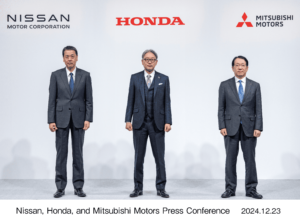Honda and Nissan’s Merger Talks- A Win-win for all
When it comes to mergers and acquisitions in the automotive industry, it can be a delicate balance that could make or break the fortunes of both entities if not thoughtfully executed, especially if high-value brands are involved. Honda and Nissan, with partner Mitsubishi, could show the way. Chandan Basu Mallik looks at the possibilities and challenges.
It is no secret that the global electric vehicle (EV) market is becoming increasingly competitive, particularly with the rise of Chinese automakers and the dominance of established EV manufacturers like Tesla. Those late to join the EV bandwagon are missing out on the plot.
Several global automotive industry players are reworking their strategies to stay competitive, innovate, and capture market share to address this issue. Take, for instance, traditional automakers like General Motors, Ford, and Volkswagen, who will continue to expand their EV portfolios with new models targeting various consumer segments, from budget-friendly compact EVs to high-performance luxury vehicles.
While this is happening, Japan’s second- and third-biggest carmakers are holding talks that could see them merge into a new holding company. Both Honda and Nissan are facing huge market challenges in EV-dominant China, falling sales and EV mandates in Europe, and potentially increased tariffs in the US.
According to news agency Reuters, Honda is currently worth US$38.8 billion and Nissan’s market capitalization is US$7.6 billion. This means, if both Japanese brands were to merge or work together as alliance partners, it would be the biggest deal since Fiat, Chrysler, and PSA (Peugeot-Citroën) came together in 2021 to form Stellantis. Honda and Nissan’s sales amounted to 7.4 million vehicles in 2023 and if the two companies did become a singular entity, they would likely end up as the third-largest manufacturer in the world behind Toyota and VW.
Nissan is now under immense pressure to execute a successful turnaround strategy. The company has already been forced to make difficult decisions, such as slashing jobs, cutting production capacity, and lowering its annual profit outlook by 70%.
Nissan’s plans in India are unaffected by the global turbulence. In addition to boosting headcount, Nissan is upgrading its Chennai facility to support the production of electric vehicles. The company plans to launch its first EV in India soon as part of its five new model introductions by 2027.
Meanwhile, Taiwan-based Foxconn, a global leader in electronics manufacturing, has expressed interest in expanding its footprint in the automotive sector. Its interest in acquiring a stake in Nissan could be considered part of a broader strategy to enter the electric vehicle (EV) market. Foxconn has already entered the automotive industry, including partnerships with companies like Stellantis and Lordstown Motors.
This is a quick look into the potential merger of Honda and Nissan and what it would bring to the table. Before any party moves forward, more elements in the equation must be factored in.
The Mitsubishii-Nissan alliance already exists (Nissan owns 24 per cent of Mitsubishi, so merging Honda, Nissan, and Mitsubishi would be a natural extension of that alliance. However, market analysts caution that mergers and acquisitions (M&A) in the automotive industry at this scale can be a high-stakes process, with the potential to impact the fortunes of both companies involved significantly.

Various factors must be investigated, including any potential complications arising from French automaker Renault’s 15 per cent stake in Nissan. Both companies are linked through the Renault-Nissan-Mitsubishi Alliance, a partnership established in 1999. This cross-ownership structure has long been a source of contention, particularly regarding corporate governance and control.
What can Nissan offer Honda and Vice-Versa?
Given the market trends, there are significant opportunities for synergies in technology, particularly in the EV space. Nissan’s leadership in EVs with its Leaf and newer models like the Ariya, combined with Honda’s hybrid and fuel cell technology innovation, could lead to a more diversified and competitive portfolio.
A merger would also lead to more significant economies of scale, helping the companies reduce costs, streamline supply chains, and better compete with Tesla and Chinese automakers such as BYD and Nio. Tesla is ahead in the autonomous driving space, but battery efficiency is still challenging. Still, the combined Japanese entity’s experience in mass production and hybrid technologies could offer a significant counterpoint.

Image Title
(L-R) Nissan Director, President, CEO and Representative Executive Officer Makoto Uchida, Honda Director and Representative Executive Officer Toshihiro Mibe and Mitsubishi Motors Director, Representative Executive Officer, and President and CEO Takao Kato
On December 23, 2024, Nissan, Honda, and Mitsubishi Motors entered into a fundamental agreement to advance discussions based on a framework established in the Memorandum of Understanding (MOU) signed between Nissan and Honda on August 1. This MoU outlined initiating a strategic partnership focusing on intelligence and electrification. Mitsubishi Motors has been actively involved in this initiative, and now, all three companies are moving forward with collaborative talks.
Honda is optimistic about the deal’s success. Honda CEO Toshihiro Mibe said the Honda-Nissan combined entity could generate over 3 trillion yen in annual revenue.
About the Author – CHANDAN BASU MALLIK
British Indian motoring journalist, seasoned automotive aficionado, marketing writer, blogger, and solopreneur specializing in copy and content writing. With over three decades of years of global automotive experience, I write on multiple domains in most digital content formats (long and short)
https://www.linkedin.com/in/chandan-basu-mallik-314612321//
@Theprimeavenue
You can connect with me on my email id chandan.theprimeavenue@gmail.com
Image Courtesy
The post uses all images to make it reader-friendly. These are all third-party images; the author never claims ownership. Prime Avenue, a professional content writing agency, is dedicated to providing readers with the latest updates and information through quality content.
You can read more about Auto World @ https://theprimeavenues.com/the-truth-about-should-i-lease-or-finance-my-used-car-in-2-minutes/